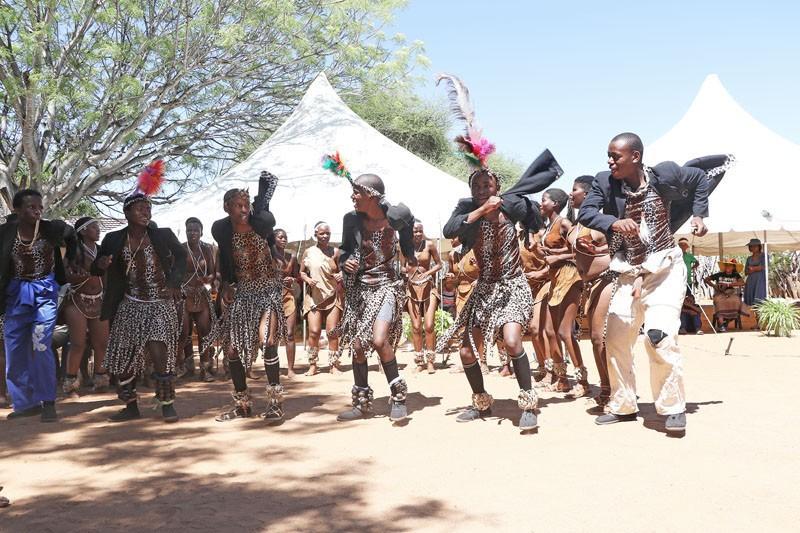Africa-Press – Botswana. As the country commemorates the legacy of its founding president, the late Sir Seretse Khama, who led from independence in 1966 until his death in 1980, the pioneer settlers of Botshabelo in Selebi Phikwe vividly remember his selfless leadership.
Sir Seretse Khama is remembered for his nation-building efforts and his visionary stance on inclusive development.
He is also remembered to have placed the welfare of all Batswana above personal or tribal gain and setting a tone for human rights, amongst others.
One of the pioneer settlers, Mr Fredrick Modise, aged 80, who also served as the Local Government police officer during Sir Seretse Khama’s era, reminisced about the evolution of Botshabelo.
Botshabelo, which means ‘a place of refuge’, holds a unique story. Its birth is a tale of struggle, symbolising a sanctuary where dreams could thrive against the odds.
The story unfolds from the plight of squatters who were drawn by the allure of better lives from the wealth hidden beneath the earth at BCL mines.
Mr Modise said aspirations of squatters were met with resistance; when the then management of BCL, prioritising safety and security, frequently chased away hopeful squatters from the vicinity of the mine, asserting control over the area and its resources.
However, the squatters found a voice in Sir Seretse Khama in 1971, when he came for a walkabout at the rugged, yet rich mining area.
His visit proved to have been transformative, as it opened a vital channel for the settlers to express their concerns and aspirations.
Mr Modise fondly remembered how Sir Seretse Khama, with an aura of compassion and understanding, encouraged the gathered settlers to move away from the mining site and seek refuge under the expansive branches of a nearby morula tree while they awaited their fate.
President Sir Seretse Khama is remembered for his words: ‘Tshabelang fa moruleng ole’.
This interaction not only fortified the bond between the community and their leader, but also gifted the area with its enduring name, Botshabelo.
And so Botshabelo was established, with its name derived from Seretse Khama’s advice, and compassion for the squatters.
This name embodies the spirit of resilience and community that the squatters needed most.
With support from the government and efforts from the local community, Botshabelo evolved from a temporary encampment into a thriving settlement.
Although Botshabelo started relatively small, it eventually gave rise to Selebi Phikwe, a vibrant town that thrived due to the opportunities created by the BCL mine that influenced the region’s economic prospects and social dynamics until its closure in 2016.
The morula tree, under which people sought refuge to establish their huts, still stands tall at the site of the Botshabelo Customary Court.
It does not only provide shade, but also symbolises the connection between the community and its history.
Its sprawling branches and vibrant green leaves serve as a silent witness to the countless stories and dreams that have unfolded beneath its boughs.
Mr Kegope Molatlhegi, 90, fondly remembers Sir Seretse Khama, for his progressive approach to governance, which prioritised a cohesive national vision over tribalism.
He highlights that although BCL’s initial establishment was through a strategic agreement between the Bangwato leadership and the then mine’s management, Sir Seretse Khama’s understanding of the balance between tribal rights and the nation’s broader interests eschewed tribalism in favour of a more cohesive national vision.
“Even though the mines were located in the then Bangwato territory, many would have expected Sir Seretse Khama to favour his tribe,” Mr Molatlhegi explained.
“However, he made it clear that the benefits of the mines should extend to the entire nation, not just to his tribe.”
Mr Molatlhegi said the decision ensured that the mine, which later became government-owned as Botswana Copper Limited (BCL), from Bamangwato Concessionary Limited, served as a source of income for more than just a limited demography; it also acted as a catalyst for national growth and development.
He also hailed the firm economic framework, which balanced economic growth with the social welfare of all Batswana, along with the foundation of peace and humility established by President Seretse Khama that had promoted national unity.
He said this environment has made it easier for the various ethnic groups in the country to accept and embrace one another.
Ninety-two-year-old Keabetswe Mokhondo expressed satisfaction with the set Presidential Commission of Inquiry into the closure of BCL.
Ms Mokhondo is hopeful that the investigation will lead to the revival of the mine, a legacy that will always remind them of Sir Seretse Khama and the origins of Botshabelo.
For More News And Analysis About Botswana Follow Africa-Press






